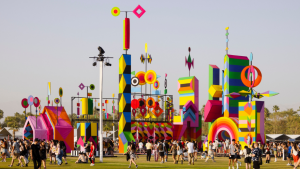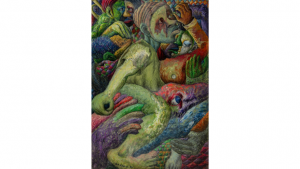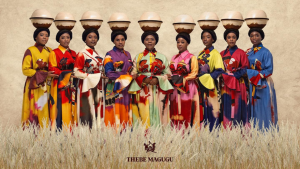The story of Little Little Orisha follows the adventures of Sango, a wandering spirit who dreams of becoming the King of Heaven, but he needs to complete high school first.
This fantasy series takes place in Heaven, a place filled with extraordinary characters, such as butterfly elephants and caterpillar trains.
Very similar to the issues that plague us earthlings, the heavenly bodies of Little Little Orisha have problems of their own. While these supernatural beings fend off all that is evil, there exists some power struggles amongst them too.
Most of the story takes place at Orisha High School, a school for the gods, but like in most high schools there are also cliques, rivalries and some forms of bullying to be found.
Sango comes across other young gods and demi-gods who are also aiming for the top spot. We meet characters such as Amadioha, the Lightning God, Eshu, the Trickster God, Obatala, the son of the King of Heaven as well as Xolani, Miss Cowbell and Osun, Sango’s love interest.
This weird and wonderful world was created by Archange Kiyindou, a young Congolese writer, who goes by the pen name Yamakasi.
The telling and the writing of stories have always been a part of Yamakasi’s life. Growing up in the Republic of Congo, he wrote story scripts and handed them out to his friends so that they could act them out on the playground. Today he has a Bachelor's Degree in Motion Pictures from AFDA Cape Town, and he would like to further his studies in film and television.
Bringing the story of Sango to life has been an incredible joint effort by artists, illustrators and editors from across the continent. The power of social media helped Yamakasi to gather these creative people together to create the work that is Little Little Orisha.
“Since the beginning of this journey I have worked with colourists and illustrators such as Nsantounkazi Deo-Gracias (Republic of Congo), Charles Oma Betow (Cameroon); Uchay Franklin (Nigeria), Kayode Ogunyomi (Nigeria), and Tolulope Adeojo (Nigeria) among others,” says Yamakasi.
The world of Little Little Orisha was inspired by events that took place in his own life.
"While growing up and going to school in Congo, I experienced bullying, inequality and favouritism in high school,” says Yamakasi.
Although he experienced some hardship at school, he says that education was always something his parents encouraged and in which they invested. They believed that it would be the key to his success and financial security.
“I have always wanted to tell the story of a hero who, by means of education, gets an amazing opportunity to open a way for his community. This is where the core concept of Little Little Orishas came from,” he adds.
As hard as growing up in this kind of environment was, he says that he always remembered a little piece of advice given to him by his father, which ultimately pushed him to create Little Little Orisha. His father told him that regardless of where you come from, you can achieve anything in life, as long as you work hard, and have enough passion.
And passion is not something that Yamakasi lacks – you can hear it in his voice when he speaks about the project, as his story is very compelling.
The story of Little Little Orisha features various mythologies and mythological creatures from around the African continent. Including these stories and characters in the animation was important for Yamakasi.
He has always loved mythology, but he only recently discovered Sub-Saharan mythologies.
“I think my whole life the only thing I associated with African mythologies was witchcraft. So, imagine my surprise when I discovered that Africa also had a range of folktales as rich and structured as the Western mythologies that I have always loved. It was mind-blowing,” says Yamakasi.
He believes that when kids read about these characters and the great things that they are capable of doing, it could instill a sense of pride in them for their African identity and heritage.
When Yamakasi read about the rich history of African folktales and mythologies, it completely changed him. “It changed my perception of Africa and it changed my perception about myself. It grew my self-esteem as a black African man, and it restored an identity that I didn't know I had,” says Yamakasi.
“Knowing that this could have the same effect on many African children around the world, I thought it would be best if my stories were based on these mythologies,” he adds
Yamakasi and his team are still trying to get the animation off the ground and into the hands of African kids. “We are currently in talks with a South African and a Nigerian studio for a potential production partnership for the animation.”
Unfortunately, artists such as Yamakasi have to rely on people and production houses from outside of his native country, due to the lack of infrastructure and support within, “There's no support structures for artists in the Congo. Art in general is not well regarded in our society,” says Yamakasi.
This is a perspective shared by many artists from the Republic of Congo. Their frustration lies in the fact that they have to rely on outside support and outside funding in order to achieve some success, or even earn some kind of remuneration.
As a way to make ends meet, Yamakasi works for a film studio in the Republic of Congo, as well as for a Nigerian comic book publisher.
The Little Little Orisha story is still in the early stages of development but Yamakasi’s dream is to see the animation series come alive on a television screen and for the world to see his work. The first comic book of the series can be found here.
Read more:
Wanuri Kahiu on using film to talk about Africans as joyful and radiant
Rovik tells the story of Kenyan migrant warrior in a far away galaxy










